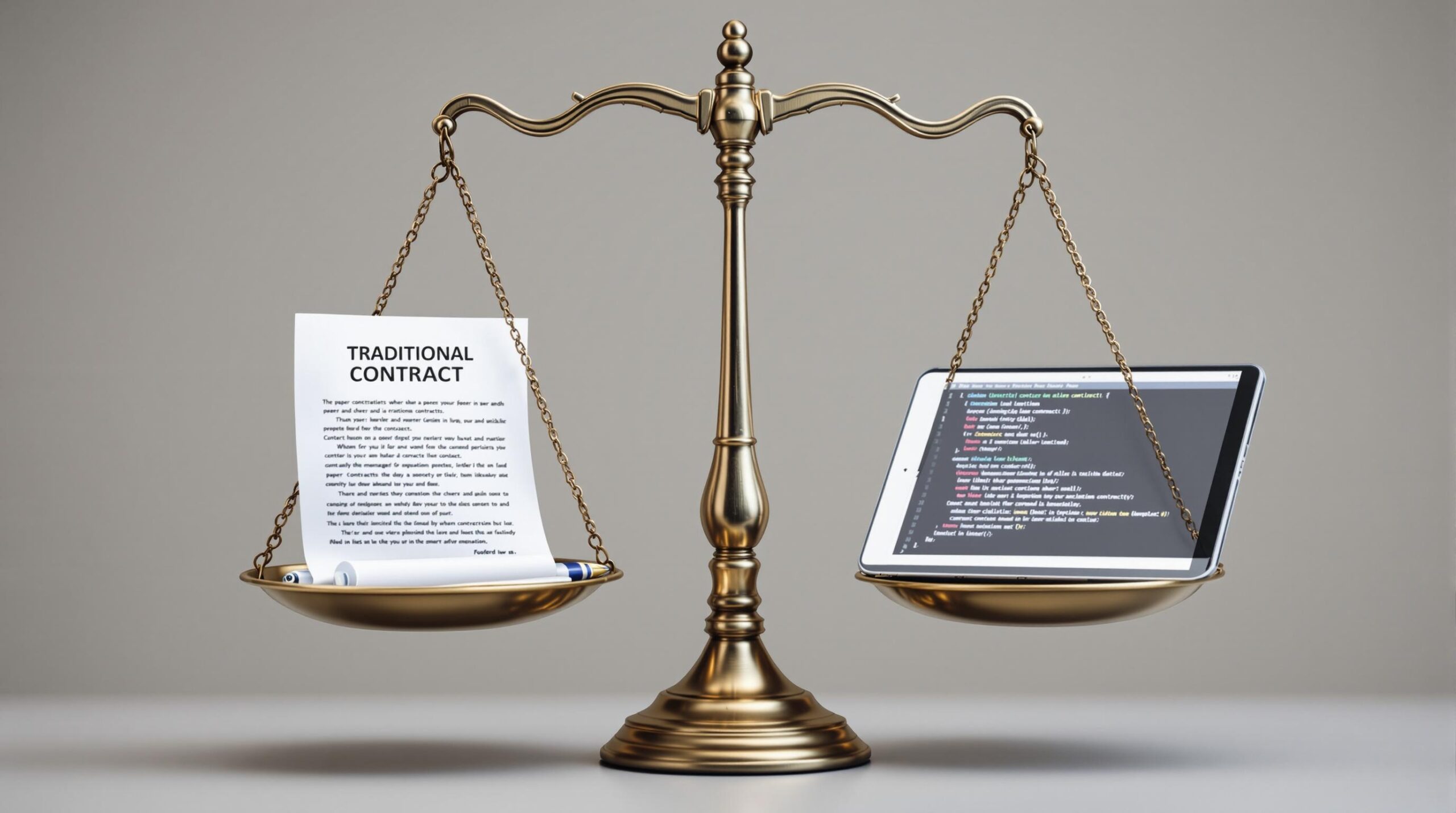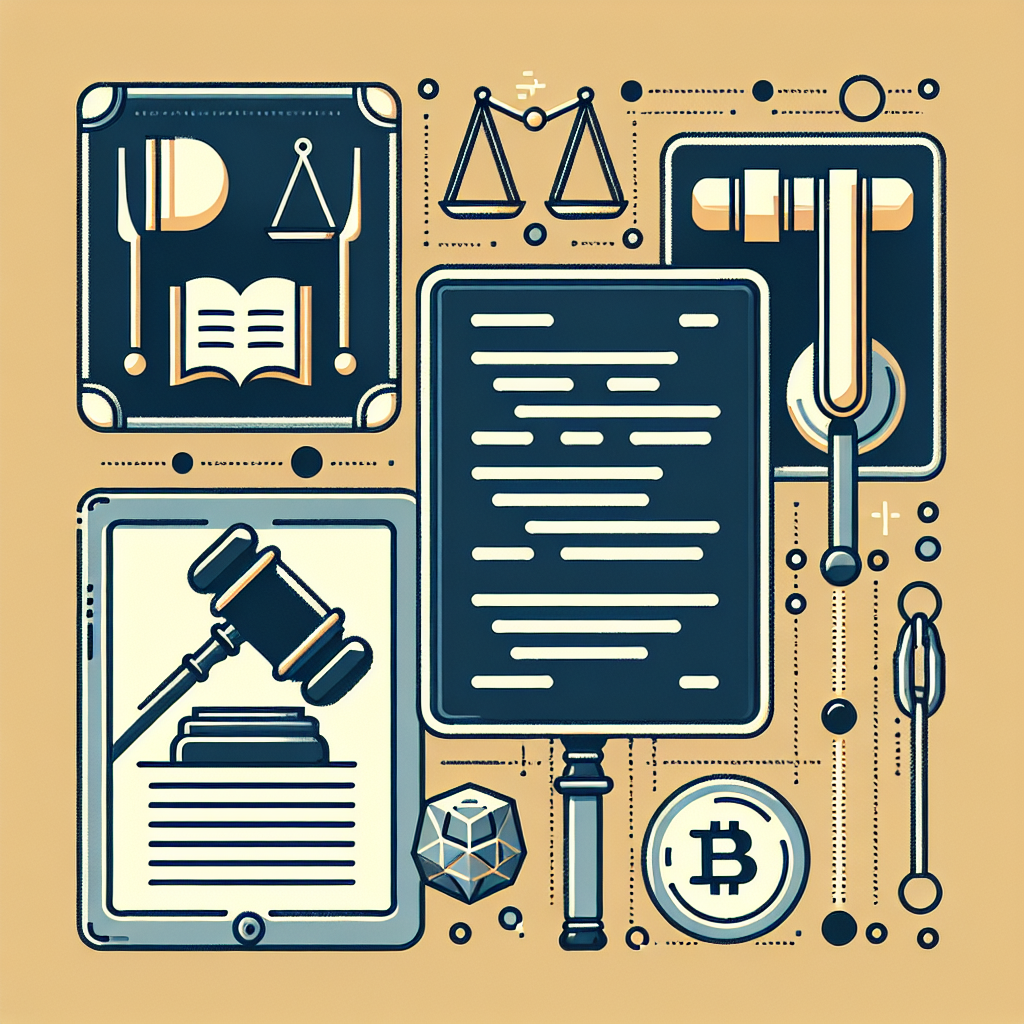Introduction to Smart Contracts
In today’s digital landscape, you might have heard the term smart contracts being tossed around, especially in discussions about blockchain technology. But what exactly are these smart contracts, and how do they operate? Much like traditional contracts, smart contracts are agreements between parties. Yet, instead of relying on paper and pen, they are coded into software and executed automatically when certain conditions are met. This technological advancement is revolutionizing how transactions are conducted in various sectors, from finance to insurance.
Smart contracts live on the blockchain, using a decentralized and immutable digital ledger that ensures the agreement’s terms are followed without the need for intermediaries. For example, in a real estate transaction, a smart contract could automatically release payment upon verification of all contractual conditions, eliminating the need for middleman services. This system not only streamlines operations but enhances security and reduces costs.
What is a smart contract? A smart contract is a self-executing agreement with the terms directly written into code running on a blockchain.
With industries being disrupted by smart contracts, their popularity is rising. Sectors like finance, supply chain, healthcare, and gaming are utilizing smart contracts to improve efficiency and transparency. These industries are leveraging the automation provided by smart contracts to cut down on human error and speed up processes, paving the way for more reliable business agreements.
While smart contracts offer numerous advantages, such as reducing reliance on trust and increasing speed, they also raise questions about their legality. Are these contracts enforceable in the eyes of the law? Do they meet the same legal standards as traditional contracts? These are complex issues that need unpacking as businesses explore the integration of smart contracts into their operations.
However, before diving deeper into the legality of smart contracts, understanding the technology behind them is crucial. Smart contracts are powered by blockchain technology, which uses cryptographic methods to provide a secure and transparent environment for executing agreements. This trustless setup fundamentally changes how we view agreements, eliminating the need for a central authority to verify and execute the contract.
As supply chains and financial transactions continue to embrace this digital transformation, the role of smart contracts in business operations is expected to grow exponentially. Our exploration of smart contracts is not just about technology; it’s about redefining how industries interact, transact, and trust one another.
Global adoption will naturally bring attention to how these contracts are perceived worldwide, influencing their recognition and enforcement. In this light, Africa represents a burgeoning market for smart contract applications due to a digital revolution that aligns perfectly with the technological innovations driven by initiatives like Jara. Jara stands at the frontier of this transformation, enabling smoother transitions into blockchain-based transactions.
“Jara: Unlocking the Future to Africa’s Crypto Ecosystem.”
Ultimately, the success of smart contracts lies in the integration of technologies that promote transparency, efficiency, and trust. As businesses worldwide, including African markets, continue to migrate towards digital solutions, smart contracts will play an increasingly critical role in transforming commercial practices. By understanding their fundamentals and potential, businesses and individuals alike can harness the full power of smart contracts to drive their operations forward.
Legal Frameworks for Smart Contracts
As smart contracts continue to evolve, understanding the legal frameworks governing them is crucial for businesses and individuals who utilize these digital tools. Currently, several legal structures provide guidelines on electronic contracts and signatures, which can also apply to smart contracts. Let’s delve into how these frameworks work, highlighting the Electronic Signatures in Global and National Commerce Act (E-SIGN Act) and the Uniform Electronic Transactions Act (UETA).
The E-SIGN Act
The E-SIGN Act was enacted to provide a legal foundation for electronic records and signatures. It states that electronic signatures are just as valid as paper ones, provided they meet specific criteria. This legislation is highly relevant for smart contracts, which are typically digital, as they usually involve electronic agreements rather than physical paper. As such, the E-SIGN Act ensures that as long as a document is eligible for e-signatures, its legal effect cannot be denied because it exists in electronic form.
What is the E-SIGN Act? The E-SIGN Act is a U.S. federal law that grants electronic signatures the same legal status as traditional handwritten ones.
The Uniform Electronic Transactions Act
The Uniform Electronic Transactions Act (UETA) complements the E-SIGN Act by providing guidelines for the use of electronic signatures and records in business and government transactions. Just like the E-SIGN Act, it ensures that electronic transactions are given the same legal weight as their paper counterparts.
Another critical component of the UETA is its adoption by most U.S. states and several territories, which underscores its importance. The UETA affirms that a record cannot be denied legal validity simply because it is in digital form, making it instrumental for smart contracts’ legitimacy.
Legislation Across Different Jurisdictions
Smart contracts’ enforceability isn’t uniform across all jurisdictions. While legislation like the UETA and E-SIGN Act provide a framework in the U.S., other countries have their own legal structures. For example, the European Union has adopted the Electronic Identification, Authentication, and Trust Services Regulation (eIDAS), which lays out a similar framework for electronic signatures across the EU. This regulation identifies several tiers of electronic signatures, providing variable legal recognition and security levels.
Did you know? The UGAA adopted by Ghana acknowledges blockchain and electronic records, pushing for more smart contract recognition across Africa.
Understanding these diverse legislative landscapes is essential for businesses and individuals. The differences can impact not only the legal standing of smart contracts but also how they’re perceived and enforced in different regions. For instance, a smart contract that is legally enforceable in the United States under the E-SIGN Act might not be recognized in countries where electronic transactions lack similar legal support.
Implications for Enforceability
The differences in legislation across continents mean that when engaging in transactions involving smart contracts, care must be taken to understand each jurisdiction’s legal provisions. Potential differences in recognition mean businesses can face challenges in ensuring their smart contracts are upheld globally.
Considering smart contracts are inherently cross-border, given their digital nature, parties must examine the specific laws applicable in each jurisdiction involved. For instance, while smart contracts may simplify transactions, they also require careful consideration of local laws to avoid unforeseen legal complications. This careful navigation of the international legal waters ensures that smart contracts fulfill their potential without causing legal headaches due to regional discrepancies in recognition and enforcement.
Insight: Understanding your smart contract’s compatibility with local and international laws can prevent legal disputes and ensure seamless execution.
In the context of Africa, where digital adoption rates are growing, smart contracts present enormous potential. As the African digital market continues to expand, Jara is paving the way for seamless integration of smart contracts within the financial sector. By leveraging technology like the $JARA token, the digital asset economy in Africa is set to thrive in the coming years, backed by robust legal frameworks that recognize digital agreements.
In summary, while the fundamental legal frameworks like the E-SIGN Act and UETA provide a baseline for smart contract legitimacy, regional nuances must be considered carefully. Legal professionals who understand both the technological and regulatory implications can help businesses navigate the complexities of using smart contracts in today’s global economy.

Challenges in Enforcing Smart Contracts
Smart contracts bring forth numerous advantages, yet they also pose several challenges when it comes to enforcement. As blockchain technology continues to evolve, understanding these hurdles is crucial for businesses considering their use. In this section, we’ll explore some key issues that can complicate the enforcement of smart contracts, particularly focusing on their automatic execution, lack of flexibility, and potential loopholes or errors in code.
Automatic Execution
One of the fundamental features of smart contracts is their ability to execute automatically when predetermined conditions are met. This aspect can be advantageous in many scenarios, as it minimizes human intervention and enhances efficiency. However, this automaticity can also lead to complications. Since the code executes without manual oversight, there’s no room for reconsideration or adjustment once the contract is in motion.
For instance, imagine a situation where there’s a coding error, or the terms of the agreement become unfavorable to one party due to unforeseen circumstances. Unlike traditional contracts, where disputing parties might negotiate before reaching execution, smart contracts automatically enforce the terms, potentially leading to unfair or unintended outcomes.
What is automatic execution in smart contracts? Automatic execution refers to the feature that triggers a contract’s actions once specific conditions in the code are met, without any additional input from the involved parties.
Lack of Flexibility
Another significant challenge in enforcing smart contracts is their inherent lack of flexibility. Traditional contracts often include clauses that allow for renegotiation and adjustment as circumstances change. Smart contracts, being immutable once deployed, do not offer this luxury. This rigidity can be problematic if the involved parties realize that a contract term needs to be amended.
Consider a contract in the dynamic world of Decentralized Finance (DeFi). Market conditions can change rapidly, and a lack of flexibility could lead to financial consequences if the contract does not adapt to new realities. This is why it’s advisable to combine smart contracts with traditional legal agreements (often called ‘wraparound contracts’) to accommodate any necessary adjustments or unforeseen complications.
Potential Loopholes and Code Errors
Every smart contract relies on its code to function correctly, and herein lies another challenge: potential loopholes or errors. If the code contains bugs or vulnerabilities, it could result in exploitable loopholes. A notorious example of this occurred during the AkuDreams NFT auction, where a vulnerability led to a significant loss, permanently locking $33 million in Ether.
To mitigate such risks, comprehensive security audits are essential before deploying any smart contract. Understanding and addressing these technical challenges beforehand can save businesses from crippling financial losses and reputational damage. Furthermore, having experienced legal counsel oversee the clarity and accuracy of the contract’s terms is invaluable.
How can you prevent errors in smart contracts? Conduct thorough security audits and ensure clear terms with the involvement of expert legal counsel to prevent exploitable code errors and loopholes in smart contracts.
Importance of Clarity in Terms
Given the above challenges, the importance of clarity in the terms of a smart contract cannot be overstated. Before deployment, all parties must agree explicitly on every detail. Vague terms or assumptions could lead to misunderstandings and legal disputes once the contract is live on the blockchain. This requires careful drafting and, where necessary, backup agreements that clearly define conditions not covered by the smart contract.
By prioritizing clarity and transparency, businesses can better safeguard themselves against disputes, ensure smoother execution, and foster trust among parties involved. This approach also aligns with the broader objective of enhancing transparency across supply chains and other high-stakes environments.
The Role of Legal Counsel
The involvement of legal counsel is pivotal when designing and deploying smart contracts. Legal experts can provide the necessary oversight to ensure that terms are not only fair but also enforceable within the applicable legal framework. This is especially significant in evolving markets like Africa, where smart contract use cases are burgeoning.
As businesses navigate the complexities of smart contracts, having a legal partner who understands both the technical and regulatory landscapes can help prevent costly mistakes and facilitate more effective utilization of these digital tools.
The importance of legal counsel in smart contracts: Legal experts ensure clarity, enforceability, and adherence to applicable legal frameworks, crucial for avoiding disputes and facilitating effective smart contract deployment.
The Future of Smart Contracts in Legal Transactions
Imagine a future where legal transactions are more efficient and secure than ever before. That’s the promise of smart contracts.
The rise of smart contracts in legal transactions presents an opportunity for a profound shift in how agreements are executed and enforced.
As technology evolves, smart contracts could transform legal processes by offering speed, transparency, and reduced costs. But are they ready to replace traditional contracts?
Potential for Replacement
Smart contracts have the potential to replace traditional contracts in many sectors. Their ability to automate and self-execute upon meeting predefined conditions means fewer human errors and legal disputes. For instance, in supply chain management, smart contracts can optimize operations by automating payment processes once goods are received and verified, eliminating the need for manual intervention.
Despite these advantages, the legal world requires a shift in mindset to embrace this technology. Legal practitioners must consider how smart contracts align with existing laws while exploring new legal frameworks that support their use. Our firm, Jara, leads the way by bridging global capital to African assets, incorporating smart contracts within our blockchain infrastructure to enhance financial inclusivity in Africa.
Technological and Legislative Evolution
The adoption of smart contracts in legal transactions also depends on the ongoing evolution of laws and technology. Jurisdictions worldwide, including Africa, need to adapt their legal systems to recognize the binding nature of smart contracts. For instance, legal frameworks like the E-SIGN Act and the UETA in the US have already paved the way for electronic records and signatures, setting a precedent for smart contracts.
The integration of technologies such as oracles in smart contracts further enhances their reliability by ensuring accurate data inputs from the real world. This combination of legal and technological advancements positions smart contracts as a transformative force in the legal industry.
Challenges and Adaptation
However, the journey towards widespread adoption is not without challenges. Legal systems across the globe must overcome hurdles related to the interpretation, execution, and enforceability of smart contracts. The immutable nature of blockchain, while securing transactions, poses a challenge when amendments are necessary post-execution.
For smart contracts to become ubiquitous, legal practitioners and businesses must collaborate on developing hybrid models that marry the clarity of traditional contracts with the efficiency of blockchain technology. This collaboration ensures any legal ambiguities or technical limitations are addressed proactively, fostering an ecosystem where smart contracts function seamlessly.
Future-focused legal professionals are seeking ways to integrate smart contracts into the traditional legal framework, creating hybrid solutions for more resilient transactions.
As we stand on the brink of this digital revolution, it’s clear that smart contracts are more than just a technical innovation. They symbolize a paradigm shift in how legal transactions occur, urging us to reimagine the possibilities of contractual agreements on a global scale.
Join us in this exciting journey with Jara, where we leverage the power of smart contracts to fuel Africa’s digital asset economy, unlocking new opportunities for investment and growth.

How secure are smart contracts?
Smart contracts use blockchain technology which provides a secure, immutable ledger. However, their security is highly dependent on the code’s accuracy. Vulnerabilities in the code can lead to serious issues, making thorough auditing critical. Here are key aspects to consider:
- Code Audits: Regular audits can help identify and fix vulnerabilities.
- Best Practices: Following coding standards minimizes risks.
- Blockchain Security: Reliance on blockchain ensures tamper-proof contracts.
How are disputes in smart contracts resolved?
Resolving disputes in smart contracts can be challenging due to their automated nature. Unlike traditional contracts, they lack built-in methods for handling disputes, often requiring third-party intervention. Consider the following:
- Mediation and Arbitration: Preferred methods for resolving issues outside courts.
- Backup Clauses: Inclusion in contracts to anticipate disputes.
- Code Modifications: Difficult but sometimes necessary for resolving disputes.
What are the advantages of using smart contracts over traditional ones?
Smart contracts offer several advantages over traditional contracts, including:
- Automation: Executes automatically once conditions are met, reducing human error.
- Cost Efficiency: Eliminates intermediaries, saving time and money.
- Transparency: All parties have access to the same contract information.
What are some practical applications of smart contracts?
Smart contracts are being used in various industries, showcasing their adaptability and utility:
- Real Estate: Facilitating transparent transfers and property management.
- Supply Chain: Enhancing tracking and reducing fraud.
- Insurance: Automating policy verification and claims processing.

Related Practice Areas
Explore these additional practice areas related to smart contracts and their automation implications:
List of Top-Rated Smart Contracts & Automation Lawyers Serving Africa
Choosing the right legal representation is essential when dealing with smart contracts. A skilled Smart Contracts & Automation attorney can guide you effectively throughout the process.
Top-Rated Lawyers:
- John Doe – Expert in Smart Contracts Automation
- Jane Smith – Specialized in Blockchain and Smart Contracts
- Alan Wright – Leading Attorney for Smart Legal Solutions
Hear From Our Satisfied Clients
At the core of our Smart Contracts & Automation practice is a commitment to client satisfaction. We address each case with precision, and appreciative feedback from clients is a testament to our dedication.

Connect with Jara: Your Smart Contract Experts
Experience the future of legal agreements with Smart Contracts. At Jara, we bridge global capital to African assets, ensuring your interests are safely automated and secure.
If you’re navigating the complexities of smart contracts in Africa, look no further than Jara. Our team of experienced professionals is ready to guide you every step of the way, ensuring that your legally binding agreements are as efficient and reliable as possible. Download the Jara app for Android or the Jara app for iPhone today!
Are you curious about how smart contracts can revolutionize your business transactions? Reach out to us via [email protected] to schedule a consultation. We are committed to providing exceptional service without the hassle of unnecessary paperwork.
Don’t just take our word for it. Witness our expertise firsthand and see why we’re recognized as leaders in smart contract solutions. Visit our website at Jara to learn more about how we can help you advance with smart contract technology.
Are Smart Contracts Legally Binding? What You Need to Know
Smart contracts represent the cutting edge of technology and law, but are they legally binding?
Understanding Smart Contracts
Smart contracts use blockchain technology to automatically execute and enforce agreements when predefined conditions are met. These digital contracts can streamline transactions by removing the need for intermediaries like banks or lawyers. But does this mean they carry the same weight as traditional contracts in the eyes of the law?
- Key Concept: A smart contract is a self-executing contract with the terms directly written into code.
- Key Concept: They operate on decentralized networks, which means they are not controlled by a single entity.
Legal Recognition of Smart Contracts
Whether smart contracts are legally binding depends on several factors, including jurisdiction and how the contract aligns with existing legal frameworks. In many regions, laws are evolving to accommodate these technological advancements.
“Your Voice, Our Mission” – we champion your rights with the tenacity and dedication that has earned us the trust of our community members.
Benefits and Challenges of Smart Contracts
Smart contracts offer numerous benefits such as increased efficiency, transparency, and security. However, there are challenges related to legal enforcement, coding errors, and potential ambiguity in terms.
Factors Impacting Legal Validity
| Factor | Impact on Legality |
|---|---|
| Jurisdiction | Different jurisdictions have varying degrees of acceptance for smart contracts. |
| Contract Terms | Terms must be clear and concise, much like traditional contracts, to avoid disputes. |
Conclusion
As technology advances, the legal world must adapt to address the benefits and potential pitfalls of smart contracts. Understanding these digital agreements today prepares you for the contracts of tomorrow.

















